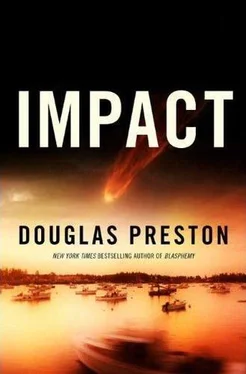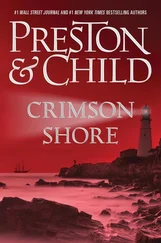"You'll get your data when I get my explanation."
"Don't play games with me."
"No games. Just an exchange of information. In your office."
A long silence. "It's foolish of you to take that line with us."
"I'm a foolish man. You already knew that. Oh, and by the way, I blew up the mine."
"You what ?"
"Blown. Gone. Sayonara."
"Are you crazy? I told you not to touch it!"
Ford made a huge attempt to control his boiling anger. He took a deep breath, swallowed. "They'd enslaved whole villages, women and children. Hundreds of people were dying. There were filling up a mass grave with the dead. I couldn't let it continue."
There was a silence. "What's done is done," said Lockwood finally. "I'll see you in my office as soon as you can get here."
Ford killed the call, unplugged the phone, and powered it down. He took a few deep breaths, trying to regain his equilibrium. It was quiet in the cemetery; twilight was falling and the last glimmer of light clipped the treetops, sprinkling the cemetery in flecks of green-gold light. Gradually he felt a bit of sanity returning. What he had seen would never leave him, as long as he lived.
And then there was the problem about the mine itself--something he had not mentioned to Lockwood. It was a realization so strange, so utterly bizarre, that it defied analysis. But the implications were terrifying.
33
Back at the wheel of his own boat, Worth cracked a beer and watched the rain running in ever-changing curves down the windows. The girls had been on the island for two hours at least. Must be a big fucking treasure , he thought.
He checked the RG .44 Mag again, the gun he'd used to rob Harrison's Grocery when he was fifteen, holding it up, sighting down the barrel, balancing it in his hand. He'd recently tried to pawn it to get money for crank but no one would take it. Said it was a piece of shit. What did they know? It had worked just fine the other night, and he smiled at the thought of all the frogs he and his uncle had turned into little pink clouds with the gun.
He sighted down the barrel, pretending to aim at a gull bobbing in the water behind the stern rail. He wished he could pot it--it would raise a nice cloud of feathers--but he couldn't risk the noise. "Bang bang," he said. The gull flew away.
He placed the gun on the dashboard, next to four boxes of bullets, a fixed-blade Bowie knife, baling wire, cutters, rope, and duct tape. He didn't think he was going to need the latter, but it was there just in case. He took another swig of beer and listened. Beyond the hiss of the rain it had become silent out there, in the fog, with only the intermittent cry of an invisible gull. He could feel the early stirrings of the crank bugs, but he ignored them. No way could he be high when it came time to pull this off.
He felt the boat move a little, the stern swinging in the freshening breeze. In the past half hour the swells had started to come in, long and low, signaling the approach of weather. He checked his watch. Five o'clock.
It was getting late. With the rising sea he knew they couldn't anchor off Shark Island for the night--too exposed. They'd get the treasure on board and run for the inner islands, probably back to the cove on Otter where they had gone to ground after that business on the admiral's island.
He heard something and listened. Faint voices coming across the water, the rattle of oars in oarlocks. They were rowing back. He could hear them shipping the oars and unloading stuff into the boat, the thump of gear, the clanging of a shovel. Their voices were low, very low. With the coming of the rain the fog had thinned, but visibility was still less than a hundred yards.
Worth gave everything a quick check. All was ready.
He heard the engine on the Marea fire up. It idled for a while as they raised anchor. They were probably messing around with the VHF radio and radar, wondering why they weren't working. If they were smart, they'd have brought a handheld radio and GPS as backup, but his search of the Marea hadn't turned up either one.
The Marea 's engine revved and Worth watched the green blob of the boat move on his radar. He glanced at his watch, marked the time. Five-oh-nine.
He reset his radar's range to two miles, turned up the gain, and watched the Marea moving westward, toward the inner islands, just as he expected. When the Marea crossed the one nautical mile line on his radar, Worth started his own engine, hauled anchor, and began following them at a distance. It was a six-mile stretch of open water to reach the shelter of the inner islands and they were cruising at six knots. The sea was getting rougher by the minute.
After about a mile, he slowed. The Marea had stopped. He quickly shut down his own engine and drifted, listening. Nothing. The Marea 's engine had definitely quit: it was dead in the water, shrouded in fog, seven miles offshore, communications down.
He restarted his engine and throttled up full, heading straight for the Marea . The image loomed on the radar, getting closer, half a mile, quarter mile, three hundred yards . . .
At a hundred yards he made visual contact, the Marea materializing out of the fog. One of the girls was messing with the VHF radio, the other had the engine hatch open and was peering inside with a flashlight. They both turned and stared at him.
Hello, bitches.
Twenty feet from the Marea he swung his boat ninety degrees to starboard, shifted into neutral, and reversed hard, bringing the boat to a sudden halt. Then he grasped the handle of the RG with both hands, took aim at the two girls, and opened fire.
34
Mark Corso slammed and locked the door to his apartment, dropped the box on the kitchen table, and rummaged frantically under the sink for a screwdriver. The baby was crying again, the air-conditioner still groaned, and sirens wailed on the boulevards, but it was all background noise to Corso, who was intent on the task at hand. Shoving the screwdriver in his back pocket, he picked up a kitchen chair and moved it into the center of the living room, climbed up, and unscrewed the light fixture in the ceiling. He pulled it down and reached up into the hole, retrieving the hard drive.
In a moment he had his desktop booted up and plugged into the drive. With a feverish intensity he typed in the password, getting it wrong three times in a row before he calmed himself. He quickly looked up Deimos's actual orbital period--which was 30.4 hours, as compared to 24.7 hours in the Martian day. Then he called up the gamma ray data and examined the periodicity: 30.4 hours.
He had spent hundreds of hours looking at high-res pictures of the Martian surface, looking for something different, something odd, something that might be a gamma ray source. But the orbiter had taken pictures of four hundred thousand square kilometers of the Martian surface at the highest resolution, and looking through the images was like looking for a needle in a haystack in a field of haystacks. Deimos was different. Deimos was tiny--a potato-shaped rock only fifteen by twelve kilometers. Whatever was generating gamma rays on Deimos would be easily found.
Hardly able to breathe, he searched the folders and files on the 160-terabyte drive and located the small one labeled DEIMOS. About three or four months before, he now recalled, the MMO had made a close pass of Deimos, hitting it with ground-penetrating radar and taking extremely high-resolution pictures. It was the first time Deimos had been imaged since Viking I in 1977.
He opened the file and saw that there were only thirty visible-light images and twelve radar images of Deimos.
Calling up the first image, he enlarged it to the highest resolution, laid a grid over it, and visually inspected each square, one at a time, for anything that looked funny. Deimos had a largely smooth, featureless surface, mostly covered with a thick gray blanket of dust, only lightly held in place by the moon's feeble gravity. There were half a dozen craters, of which only two had been named, Swift and Voltaire.
Читать дальше












